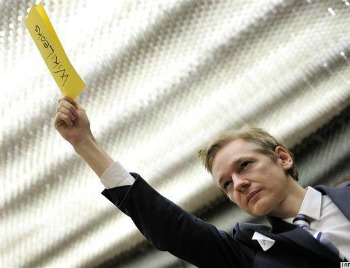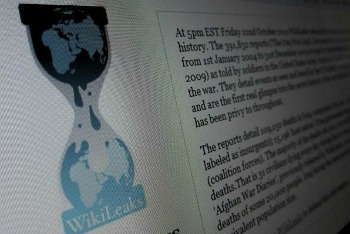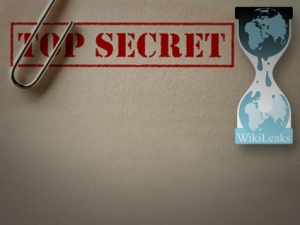Taking Stock of WikiLeaks and Cablegate: A “Napster Moment” for Government?
Drip, drip, drip…
For analysts of both public and traditional diplomacy and international relations, the gradual release of only about 3,000 of over 250,000 U.S.-origin diplomatic communications is a bit like being subjected to Chinese water torture. Even if the rate of publication is stepped-up somewhat, trying to assess the larger meaning and impact of Cablegate is likely to remain difficult.
One thing, though, is certain - the story is not about to end. Since Cablegate first burst onto the scene about two months ago, it has been with us every day since. Given the relentless pressures of the 24/7 news cycle, this must amount to something of an endurance record. Inevitably, however, the story is beginning to show signs of degeneration into infotainment. Coverage of specific message content is now being displaced by lurid gossip and reports on the endless legal wrangling surrounding the site’s founder.

Julian Assange.
The Associated Press, December 2010
The novelty has worn off, audience fatigue is setting in.
This juncture, then, provides an opportunity for some preliminary stocktaking.
Some of the early reactions, for example, seem in retrospect to have been somewhat over the top. As reported in summary on
Waxy, Secretary of State Hillary Clinton told reporters, “It is an attack on the international community, the alliances and partnerships, the conversations and negotiations, that safeguard global security and advance economic prosperity.” NATO condemned the release, saying “it endangers civilians and military personnel… It is illegal, irresponsible and dangerous.” George W. Bush, Senator Joe Lieberman and Rick Santorum described the Wikileaks release as “terrorism.” Mike Huckabee called for Julian Assange’s execution. Sarah Palin wrote on Facebook that Assange is “an anti-American operative with blood on his hands.” Well… To date, despite legitimate concerns over the possible exposure of sensitive sources, there have been no casualties attributable to Cablegate. The international business of governments accumulates quickly and has carried on, as it must, apparently without major hiatus. Diplomacy - that indispensible approach to the management of international relations characterized by dialogue, negotiation and compromise - by all accounts continues.
Given the limited possibilities associated with the remedial use of hard power in the age of globalization, there are very few practical alternatives to diplomacy. This is particularly true in addressing the host of issues which are rooted in science and driven by technology - climate change, pandemic disease, resource scarcity - none of which are amenable to the application of armed force. Indeed, concerns over the militarization of international policy seem finally to be coming to the fore. Governments really have no choice but to keep talking, and for that reason alone any costs imposed on diplomatic practice are likely to prove temporary.
While this episode may, then, induce a chill, Cablegate has not, as was initially feared, become a diplomatic show-stopper.
So, what is it?

Gary Hershorn/Reuters
Some would characterize the tale in heroic terms, citing it as an example of information freedom, a massive leak generally supportive of the public interest and the people’s right to know. That argument seems to me rather problematic. A quarter of a million messages do not constitute a leak, but instead an undifferentiated deluge, a data dump. Like freedom of speech, moreover, the freedom of information doctrine has some limits, especially when the information gathered was obtained in confidence or relates to legitimate concerns about security.
The case for whistle-blowing, too, seems somewhat shaky. Whistle-blowing refers typically to the exposure of corruption, wrong-doing or criminal behaviour. But probity is not the issue here. Instead, the main motive behind the release of this enormous trove seems to have had more to do with the simple fact that the material was available than with the service of any high public or moral purpose.
In my view, Cablegate represents more than anything else an excellent illustration of the double-edged, paradoxical quality of science and technology. Even as S&T is providing solutions to some of the world’s most vexing challenges - public health, environmental remediation, genomics - it is creating new ones of its own. In this instance, the very technologies which have facilitated modern diplomatic communications have also made possible their unauthorized reproduction and mass dissemination.

WikiLeaks founder Julian Assange, adjusts his sunglasses as he leaves a press conference in Geneva earlier this month.
FABRICE COFFRINI/AFP/Getty Images.
Like so much else associated with globalization, S&T cuts all ways.
In the vastness of its scale, Cablegate also represents an unprecedented violation of individual privacy and confidentiality. Those who drafted the messages, and those with whom they were speaking, did not expect to read an account of their exchanges on the front page. To the extent that diplomacy is based upon relationships of trust and respect, this subversion of privacy and confidentiality will probably inhibit candid dialogue. Higher levels of classification, more limited distribution, fewer written records, and recourse to other forms of transmission, such as secure telephony, can also be predicted.
None of that is cause for celebration.
There remains as well a public diplomacy angle which has attracted little attention but is nonetheless worth examining. Although none of these messages were ever intended for public consumption, within the USA their publication has in general had a tonic effect on the image and reputation - the brand - of diplomacy per se. Several critics of the State Department have allowed that their estimation of the place has improved. Diplomats are shown as relevant, effective, and working very hard at doing their jobs.
Rarely have members of the public been afforded such insights into what diplomats actually do: making contacts, maintaining networks, and adding unique value by advocating policies, pursuing interests, and providing advice and analysis to policy and decision-makers. For the first time in many years, and even if only fleetingly, interest in diplomacy has migrated from the esoteric margins of public consciousness into something closer to the cultural mainstream.
At home, the world’s second oldest profession may come to be
seen in a slightly more sympathetic light as a result.
The impact of these disclosures outside of the USA is more difficult to assess. Some governments and foreign nationals may be offended by the unvarnished assessments and critical commentary contained in the reports. And to be sure, one would not want to see vulnerable sources - for instance, pro-democracy campaigners in China or dissidents in Zimbabwe - compromised or exposed as a result of the revelations.
Over the longer term, there may be some lasting damage to U.S. power and prestige. The end of unipolarity, power shift to the Asia Pacific and the rise of the BRICs, the financial crisis and hollowing out of the domestic economy have already spawned a renewed wave of commentary about American decline.
Viewed as a whole, these cables do not illustrate the seamless inner workings or high-level strategic calculus of an empire at the top of its game. Instead, readers are offered the chronicles of something akin to imperial retreat - snapshots of defensive, rearguard actions and generalized geopolitical disarray. Given the magnitude of the recession still besetting the USA, for example, one might have expected to see intensive coverage of the various national responses to the global financial crisis. Economic reporting, however, has been notable mainly for its absence.
That is surprising, and suggests the kind of drift - a lack of priorities and direction - which historians associate with the demise of great powers.
By virtue of its very occurrence, is this, then, a “Napster moment” for the state, a game-changer from which there is no turning back?
Quite possibly.
But again, these are early days yet.
Tags
Issue Contents
Most Read CPD Blogs
-
January 29
-
January 20
-
December 17
-
January 28
-
December 15
Visit CPD's Online Library
Explore CPD's vast online database featuring the latest books, articles, speeches and information on international organizations dedicated to public diplomacy.









Add comment